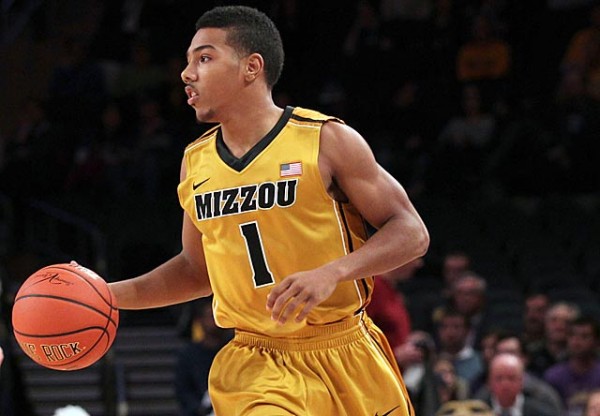SEC Preview: Missouri Tigers
Posted by DPerry on October 22nd, 2012Go back to March 2011: Missouri, after just sneaking into the field of 68, had just been trounced by Cincinnati, capping off an unremarkable season in unremarkable fashion. The Tiger faithful may have had more ambitious goals entering the year, but they could hardly complain. Their team had recovered admirably from the calamitous Quin Snyder reign and were establishing themselves as a secondary Big 12 power. Head coach Mike Anderson demanded relentless defensive intensity and valued athleticism, ensuring a brand of exciting basketball that didn’t always accompany wins. If that wasn’t enough, after Arkansas came calling, Anderson soundly denied rumors that he would jump ship, claiming instead that he intended to retire in Columbia. Armed with a committed coach and a roster bursting at the seams with returning talent, Missouri was in position to challenge longtime rival Kansas and rising Baylor for conference supremacy.
What followed made for one of the most compelling storylines of last college basketball season. Anderson took the job in Fayetteville and Missouri was left scrambling for a replacement. After being rejected by their first few choices, the administration hired Miami’s Frank Haith, a decision which was met with a resounding “Huh?” Haith’s record with the Hurricanes (a .384 ACC winning percentage and one NCAA tournament appearance in seven seasons) would have made you think he was more likely to get the can than an offer to move to a superior program. Shortly thereafter, the college basketball gods rubbed a little salt in Missouri’s wound, as Haith was implicated in the Nevin Shapiro scandal, leading some fans and members of the media to call for a suspension. Add in a season-ending injury to forward Laurence Bowers, and the relatively high expectations for Tiger basketball plummeted. Unless you’re a newcomer to college basketball (in which case, welcome), you know how the story ends. Missouri rode a 14-0 start to a Big 12 Tournament title and a #2 seed in the NCAA Tournament. The guard-heavy offense flourished in Haith’s system, finishing as the most efficient in the nation. Its first-round shocker against Norfolk State notwithstanding, Missouri can reflect fondly on the 2011-12 season.
The Tigers won’t be able to rest on their success long, however, as 2012-13 presents even more challenges. Missouri lost five of its seven rotation players, including All-Conference performers Marcus Denmon, Ricardo Ratliffe, and Kim English. The biggest change though is the school’s move to a new conference. The quality disparity between the Big 12 and the SEC is negligible (at least at the top), but the players and coaching staff will not have the luxury of familiarity with their opponents. Haith will have his hands full with all the adjustments that need to be made, but he at least has the ingredient most essential to success: talent.
Phil Pressey, a player short on size but long on intangibles, returns to run the show coming off an elite-level point guard season where he recorded a 2.62 assist-to-turnover ratio. His shooting percentages have some room for improvement, but he should not have to be counted on to score for the offense to run smoothly. He’s athletic enough to make plays with his speed, but he does not rely on his physical gifts, opting for a more cerebral approach that makes him a killer in the pick-and-roll. He will immediately become the top point guard in the conference. Shooting guard Michael Dixon was a sixth-man in name only for last year’s team so he should not have much trouble adjusting to a starting role as he averaged 26.7 minutes per game last season.
The one and two spots are set, but Haith will be able to get creative with the rest of his rotation. With incoming transfers Keion Bell, Earnest Ross, and Jabari Brown (eligible in January) ready to contribute, he has the personnel to maintain a perimeter-oriented attack. Bell racked up a ton of points in his three seasons at Pepperdine, but they came at the prices of low shooting percentages and a high number of turnovers. Without the burden of being the primary scorer, he should have an opportunity to improve his offensive efficiency. Ross revealed some defensive and rebounding ability in big minutes at Auburn, but he’s another player who needs to be more selective with his shots. Brown should be a familiar name to those who follow the recruiting game closely — his talent is undeniable, but he could struggle to find a clear role in the backcourt when he regains eligibility.
The Tigers’ frontcourt situation is top-heavy. Bowers is an athletic big man with a skillful offensive game and solid shooting stroke. If he can return to form after his ACL injury, he will be a key contributor. Landing Connecticut transfer Alex Oriakhi was a coup for Haith as long as he can return to his sophomore season (the national title year) form. His size and athleticism should enable him to dominate the glass and protect the rim. Junior college transfer Tony Criswell should be counted on to contribute, and freshmen Stefan Jankovic and Ryan Rosburg will compete for the few remaining minutes.
They won’t be able to match the combination of ability and experience of last year’s edition, but the 2012-13 Missouri Tigers will still have plenty of talent. The play of Pressey and Dixon in the backcourt will be vital, especially in the non-conference schedule as Haith tries to find his optimal regular rotation. Few programs can match the number of big time players on their roster, but chemistry will make or break this team. If the pieces mesh as well as they did last season, Missouri will could challenge Kentucky and Florida for the SEC crown in its first year in the league.











































